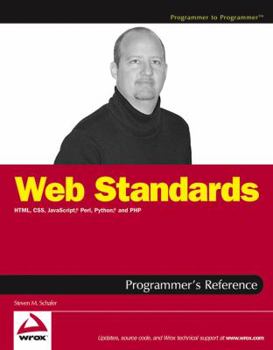Web Standards Programmer Ref
This invaluable resource offers tutorials and real-world examples as well as thorough language references for Web markup languages (HTML/XHTML and CSS), and popular scripting languages (JavaScript,... This description may be from another edition of this product.
Format:Paperback
Language:English
ISBN:0764588206
ISBN13:9780764588204
Release Date:August 2005
Publisher:John Wiley & Sons
Length:812 Pages
Weight:2.75 lbs.
Dimensions:1.9" x 7.4" x 9.3"
Customer Reviews
1 rating
replaces 6 books [one for each language]
Published by Thriftbooks.com User , 18 years ago
How the Web has grown! In doing so, and aiding its growth, has been the use and development of several languages. Naturally, Schafer starts with the language that birthed the Web - HTML. Actually this needs its dual ("twin") on a server, http. But Schafer discusses http in a later chapter devoted to CGI. Hopefully, you should be able to appreciate that HTML is simple. In fact, of all that the book discusses, HTML is the simplest language. Several initial chapters walk you through HTML. It must be stressed that mastery of HTML is needed to make sense of the rest of the book. The later languages either extend the scope of an HTML file, or they generate the file, roughly speaking. Cascading Style Sheets (CSS) lets you easily factor out common definitions that are used across multiple web pages, where you can imagine that each web page corresponds to a file storing it. Schafer explains how to use CSS to simplify management of a set of HTML files. A centralised way to set common fonts and the like. More robust. But HTML is a declarative language. Good, because laymen can more easily understand and write such languages. It's easier to say what should be done, than how to do it. But for the times when you need more expressive power on the browser, Schafer offers JavaScript. A procedural language that actually has nothing to do with Java. [The coincidence in names was a marketing ploy.] Schafer does not ignore the server. CGI is given, as the first generation attempt at server side code. Its limitations spawned the use of Perl, PHP and Python for easier parsing of user input and generation of new dynamic pages. Each of these languages (HTML, CSS, JavaScript, Perl, PHP and Python) is often the subject of its own book. No surprise then that Schafer explaining all 6 gave us a book of this length!




